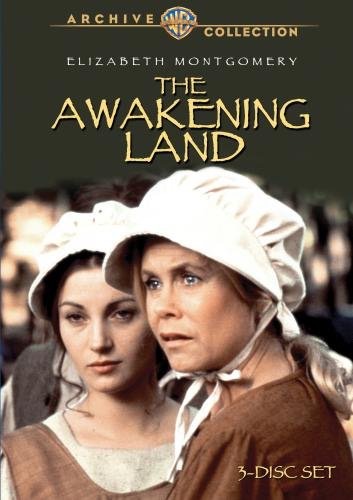A confluence of innovations in media delivery has made a 40-year-old TV gem available to a new generation. The 1978 production of The Awakening Land was part of a wave of literary works filmed for television which included the ABC miniseries Rich Man, Poor Man, broadcast in 1976, and the same network’s ground-shaking multi-generational saga Roots the following year. While the 12-hour Roots cost only $6.6 million to film, the final episode drew a viewing audience of 130 million.
Franco Zefferelli’s 1977 Jesus of Nazareth for NBC was another success story for the medium. The mega-budget for Zefferelli’s project, estimated somewhere between $12 million and $45 million (it was a complicated international production, with equally complicated financing), was offset by the chance for repeat viewings in front of a guaranteed audience on religious holidays, an adventage denied to most miniseries. Viewers willing to give up six to twelve hours of viewing time for a single title, could seldom be compelled to sit through it all again. NBC’s 1978 production based on Arthur Hailey’s Wheels famously did not survive a second airing. Seeing ratings plummet with each episode, the network pulled the plug early, allowing a voice-over announcer to fill in the remainder of the story for anyone in the audience who still cared.

One of the small treasures of the medium was the six-hour adaptation of Conrad Richter’s Awakening Land trilogy, The Trees, The Fields, and The Town, set in central Ohio from 1790 into the early decades of the 1800’s. If Richard Chamberlain was rightfully proclaimed king of the miniseries, Elizabeth Montgomery was surely the queen of movies-for-television, a medium in which she specialized at playing such rough characters as real-life convicted poisoner Blanche Taylor Moore, legendary outlaw queen Belle Starr, and Lizzie Borden, who needs no introduction.
In The Awakening Land, Montgomery’s only foray into the television miniseries, she plays Sayward Luckett, the eldest daughter of part-Delaware frontiersman Worth Luckett, who brings his wife Jary (the versatile Louise Latham, born a mere eleven years before Ms. Montgomery) and his four daughters into the wild land west of the Alleghanies. As we first glimpse the family moving through the dense undergrowth of a virgin forest, the sight of the 40-something Montgomery trying to pass for a 17-year-old can be off-putting for the few minutes it takes us to adjust. That we are quickly won over is probably a testament to the blessings of excellent bone structure and cascading blonde locks. Hal Holbrook, and somewhat more youthful versions than we are used to seeing of Wilford Brimley, Jane Seymour, and William H. Macy (in his first screen credit), round out a splendid cast.
Since the show ends around the time of Thomas Lovewell’s birth at Nelsonville, Ohio, I knew that seeing it would mean more to me a second time around, and happily discovered that it became available for home viewing a few years ago. Not only has The Awakening Land returned, it has never looked better, a vibrant widescreen presentation on DVD, digitized from what seems to be a pristine 35mm print. Warner Archive discs are duplicated in small batches as demand warrants, allowing the company to distribute unfairly forgotten treats like this one.
A few of the scenes will remind some viewers of stories from Lovewell history, such as the near-abduction of little Morrfyd Davies along the bank of White Rock Creek in the 1860’s. Orel Jane Lovewell reportedly came to the rescue that day, swapping a bar of soap for the endangered child. In “The Awakening Land" the abduction is successful, and since the teleplay apparently ran out of time to tell the full story, the curious will have to read Richter’s final volume, The Town, to learn the fate of Sulie Luckett. At least Sulie gets to make an appearance in the film. The Luckett girls’ brother Wyitt apparently proved to be one family member too many for the screenwriters to juggle. One character who vanishes from the miniseries in the early going and pops up again toward the end is Sawayrd’s father, Worth Luckett, played by Tony Mockus. When Worth reappears, darned if he doesn’t look remarkably like the image of Thomas Lovewell from those family reunion photographs taken when the Kansas pioneer was in his late 80’s.
Along with his traditional historical research, Richter diligently studied early-American speech patterns, so anyone wondering how Ohioans might have sounded, circa 1800, or how a flourishing town developed from a single frontier cabin, can now curl up and enjoy a 333-minute trip back to American’s very first wild, wild West - Ohio.